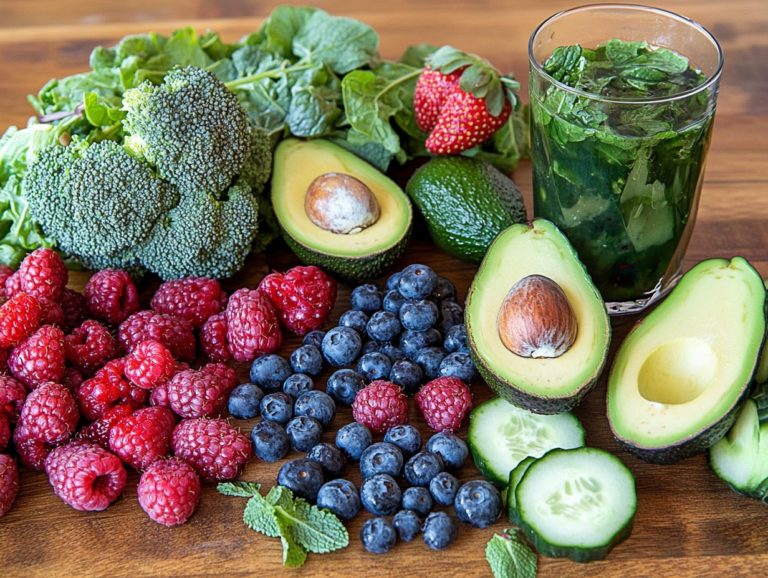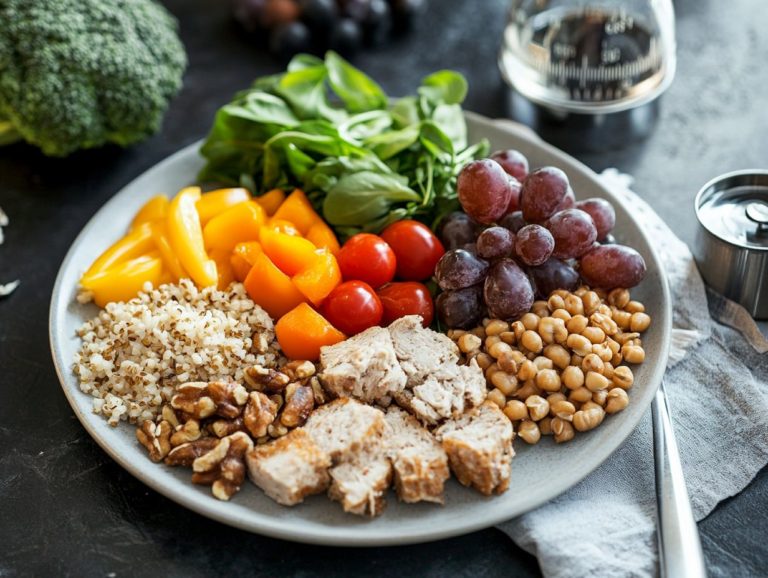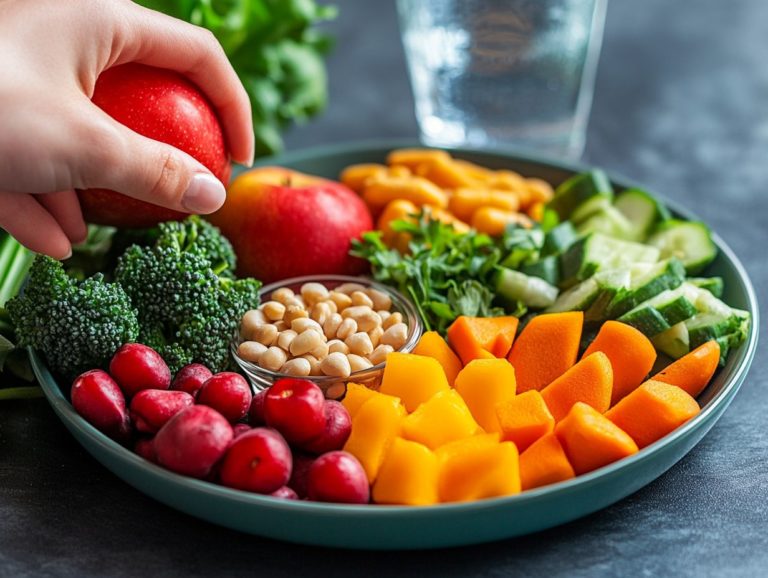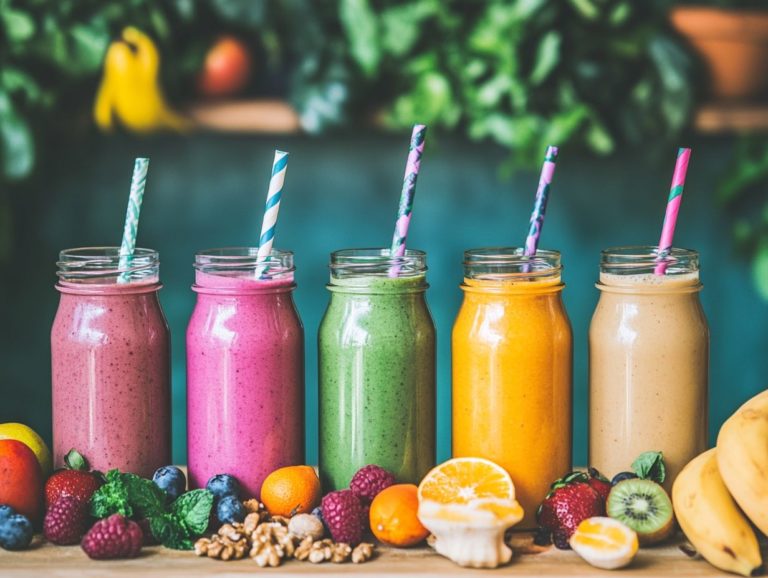Holistic Nutrition Tips for Athletes
Athletes need more than just rigorous training to truly excel; their performance is intricately linked to the nutrition they consume. Understanding the impact of nutrition on athletic performance is essential for maximizing your strength, endurance, and overall health.
Get ready to discover how optimal nutrition can take your game to the next level! This article guides you through key types of nutrients, such as proteins, carbohydrates, and healthy fats, while also providing strategies for crafting balanced meal plans.
It explores the role of supplements, hydration, recovery nutrition, and holistic approaches that highlight mindfulness and whole foods. Discover how optimizing your diet can elevate your game to new heights!
Contents
- Key Takeaways:
- The Importance of Nutrition for Athletes
- Key Nutrients for Athletes
- Creating a Balanced Meal Plan
- Meal Timing and Nutrient Distribution
- Supplements for Athletes
- Top Supplements for Optimal Performance
- Hydration for Athletes
- Proper Hydration Strategies for Athletes
- Recovery Nutrition for Athletes
- Post-Workout Nutrition Tips
- Holistic Approaches to Nutrition for Athletes
- Frequently Asked Questions
- What is holistic nutrition and how can it benefit athletes?
- What are some key elements of a holistic nutrition plan for athletes?
- How can athletes support their recovery with holistic nutrition?
- Are there any specific nutrients that athletes should focus on in a holistic nutrition plan?
- How can an athlete’s diet affect their mental well-being?
- Can athletes still enjoy their favorite foods while following a holistic nutrition plan?
Key Takeaways:
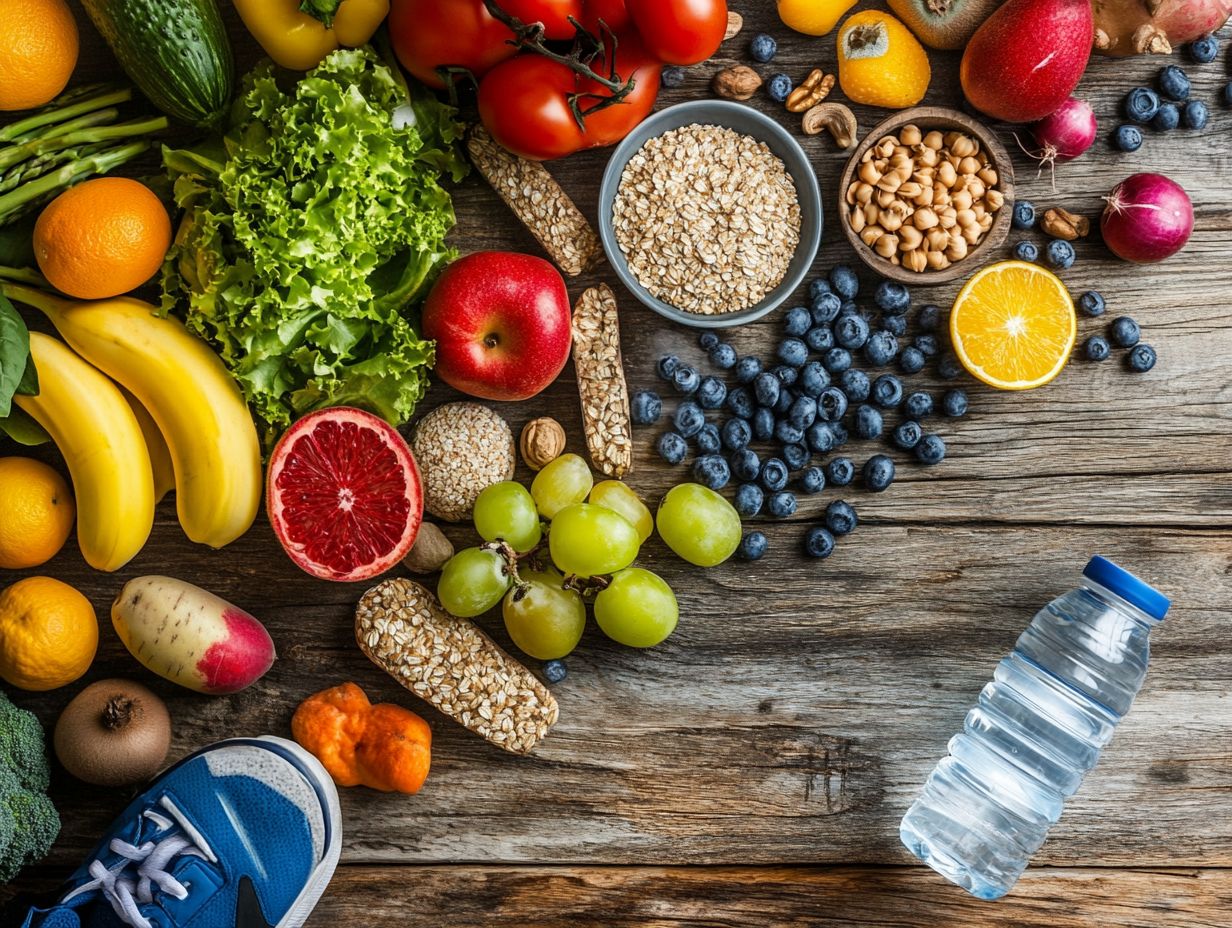
- Nutrition is essential for athletes to perform at their best and reach their full potential.
- Protein, carbohydrates, and healthy fats are key types of nutrients that support energy, muscle recovery, and overall health.
- Creating a balanced meal plan with proper timing and nutrient distribution, along with incorporating mindfulness and whole foods, can optimize athletic performance and aid in recovery.
The Importance of Nutrition for Athletes
Nutrition plays a pivotal role in athletic performance and overall well-being. A thoughtfully structured diet fuels your physical exertion, enhances recovery times, and promotes holistic health.
By prioritizing nutrient-dense foods and tailoring your nutrition plan to your specific needs, you can optimize energy levels, achieve peak performance, and improve nutrient absorption.
Understanding the significance of sports nutrition helps you make informed food choices that support your wellness journey and elevate your athletic endeavors.
How Nutrition Affects Athletic Performance
The connection between nutrition and athletic performance is remarkable, directly impacting energy levels, endurance, and recovery. To achieve optimal performance, prioritize proper hydration and maintain a balanced intake of different types of nutrients: proteins, carbohydrates, and healthy fats.
Strategically timing your nutrient intake can significantly elevate your performance during both training and competition. For instance, consuming carbohydrates before an event maximizes glycogen stores, essential for endurance, while post-exercise protein intake facilitates muscle repair.
Hydration, often underestimated, is vital for maintaining peak physical condition. Even minor dehydration can diminish strength and stamina. A well-rounded diet supports your training intensity and strengthens your immune system, keeping you healthy and prepared to compete.
By adopting a mindful approach to nutrition, you lay the foundation for sustained athletic success.
Key Nutrients for Athletes
As an athlete, you need a comprehensive intake of essential nutrients to fuel demanding training sessions and reach performance goals. Understanding the importance of different types of nutrients, like proteins, carbohydrates, and fats, along with micronutrients is key to unlocking your full athletic potential.
Protein, Carbohydrates, and Healthy Fats
Understanding the balance of proteins, carbohydrates, and healthy fats is essential for athletes seeking to elevate performance and recovery. Each type of nutrient plays a pivotal role in providing energy, supporting muscle growth, and maintaining overall health.
Proteins are crucial for muscle repair and growth. Many athletes turn to nutrient-dense options like chicken, lentils, and Greek yogurt to rebuild tissues after intense training sessions.
Carbohydrates serve as your primary energy source during workouts. Whole grains, fruits, and sweet potatoes are excellent choices to fuel endurance.
Healthy fats, found in avocados, nuts, and olive oil, support long-term energy, hormone production, and nutrient absorption.
Consider insights from renowned distance runners who have shared how adjusting carbohydrate intake before races has significantly boosted their endurance, highlighting the tangible impact that dietary choices have on performance.
Creating a Balanced Meal Plan
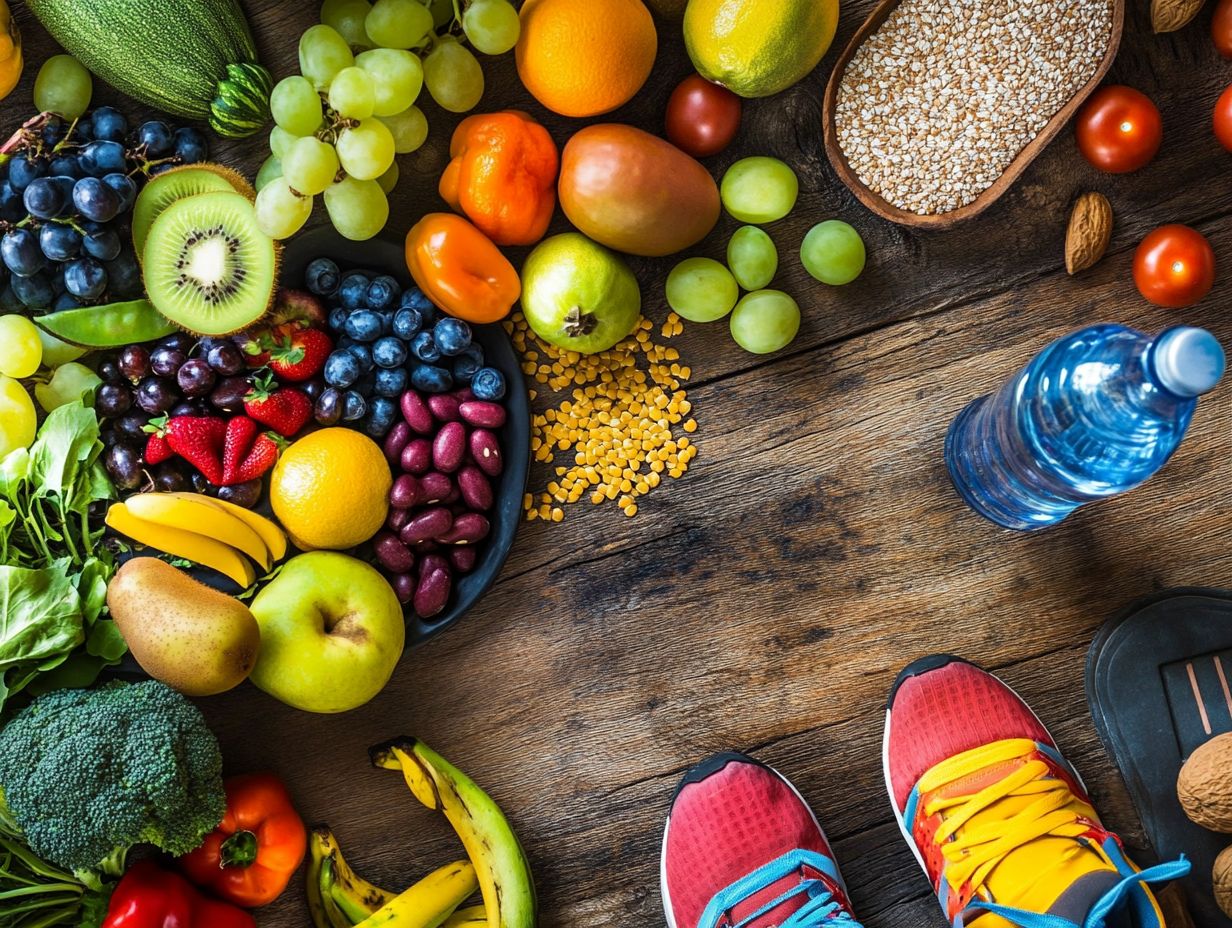
Crafting a balanced meal plan is crucial for athletes seeking peak performance and effective recovery. A thoughtfully designed meal plan guarantees dietary equilibrium while considering unique nutritional requirements, enhancing optimal nutrient absorption.
Start optimizing your nutrition today for the best performance of your life!
Meal Timing and Nutrient Distribution
Meal timing and nutrient distribution are essential for optimizing your athletic performance and recovery. By strategically planning when you consume nutrients, you can boost your energy levels and enhance your recovery process.
Research indicates that consuming carbohydrates and proteins within specific windows can significantly influence your performance outcomes. For instance, fueling up with a carbohydrate-rich meal before your morning training provides the energy you need for an intense workout, and a balanced intake of protein afterward aids in muscle repair.
It may be beneficial to spread your meals throughout the day. Focus on a higher carbohydrate intake earlier to sustain energy levels, and gradually incorporate more protein as the day progresses.
This approach also helps maintain your performance during training sessions and supports recovery and muscle growth during rest periods. This enables you to consistently perform at your best.
Supplements for Athletes
Supplements are game-changers for athletes! They provide essential support for performance enhancement and recovery. While it’s crucial to prioritize whole foods as your primary source of nutrients, certain supplements can significantly improve nutrient absorption and elevate your overall athletic performance.
Top Supplements for Optimal Performance
Several top supplements can significantly elevate your athletic performance by enhancing hydration, recovery, and muscle building. These include protein supplements, energy boosters, and hydration formulas tailored to meet athletes’ unique needs.
Many athletes rely on these products not just for performance but also for overall well-being. For instance, protein supplements are crucial for muscle repair and growth, enabling you to recover more swiftly after intense workouts.
Energy boosters, often packed with carbohydrates and caffeine, help sustain energy levels during demanding training sessions and competitions. Hydration formulas, rich in electrolytes, are vital for maintaining peak physical performance, especially in warm conditions.
Hydration for Athletes
Hydration is essential for athletic performance, profoundly influencing your energy levels and recovery. By ensuring you maintain optimal fluid intake, you’ll perform at your peak and recover more effectively after demanding training sessions.
Proper Hydration Strategies for Athletes

Proper hydration strategies are crucial for maintaining peak performance and achieving effective recovery. Understanding your fluid intake needs and electrolyte balance is key to developing a personalized hydration plan.
Before your workout, make sure to consume the right fluids and electrolytes to prepare your body and minimize the risk of dehydration. Consider the timing and types of beverages you re consuming; simply drinking water may not be enough if you re engaging in prolonged or intense activities.
After your workout, replenishment is vital. Rapidly restoring the fluids and electrolytes lost during exertion is essential for recovery. Monitor your hydration levels checking the color of your urine or using hydration tracking apps can help you fine-tune your intake based on your needs.
This way, you ensure your body remains in optimal condition during and after your training sessions.
Recovery Nutrition for Athletes
Recovery nutrition is an essential aspect of your athletic diet. It focuses on replenishing lost nutrients and promoting effective recovery after training or competition.
By prioritizing proper post-workout nutrition, you can enhance your recovery time and elevate your overall athletic performance. Start focusing on your recovery nutrition today and watch your performance soar!
Post-Workout Nutrition Tips
Post-workout nutrition is essential for athletes aiming to maximize recovery and replenish energy levels. By implementing effective strategies, you can enhance getting the nutrients your body needs and support overall recovery.
To achieve optimal results, focus on consuming a balanced meal rich in carbohydrates and protein within 30 minutes after your workout. Consider options like:
- Grilled chicken paired with quinoa
- A smoothie made with Greek yogurt and mixed berries
These foods provide the necessary nutrients to restore glycogen levels and rebuild muscle tissue. One common oversight is neglecting hydration; it’s vital to drink enough water to replace the fluids lost during exercise.
Avoid overly processed snacks, as they can hinder recovery. By prioritizing whole foods and ensuring proper hydration, you can supercharge your recovery!
Holistic Approaches to Nutrition for Athletes
Embracing a holistic approach to nutrition can significantly enhance athletic performance. It’s about more than just fuel; it’s the art of mindful eating, prioritizing whole foods, and exploring naturopathy for athletes, which nurtures emotional well-being.
This comprehensive perspective on nutrition nourishes your body and promotes sustainable eating practices that will serve you well in the long run.
Incorporating Mindfulness and Whole Foods
Incorporating mindfulness into your eating habits and focusing on whole foods can significantly enhance overall well-being and performance. Mindful eating encourages better food choices while fostering a deeper connection with your body’s nourishment needs.
By being present during meals, you can cultivate awareness of hunger and satiety signals, allowing you to make informed decisions about what and how much to eat. This approach enhances your enjoyment of meals and encourages selecting nutrient-dense options that fuel your training and recovery.
To seamlessly integrate mindfulness into your routine, start by slowing down, chewing food thoroughly, and truly appreciating the flavors and textures of each bite. Opting for whole, minimally processed foods provides essential vitamins and minerals necessary for optimal performance, further elevating your athletic journey.
Frequently Asked Questions
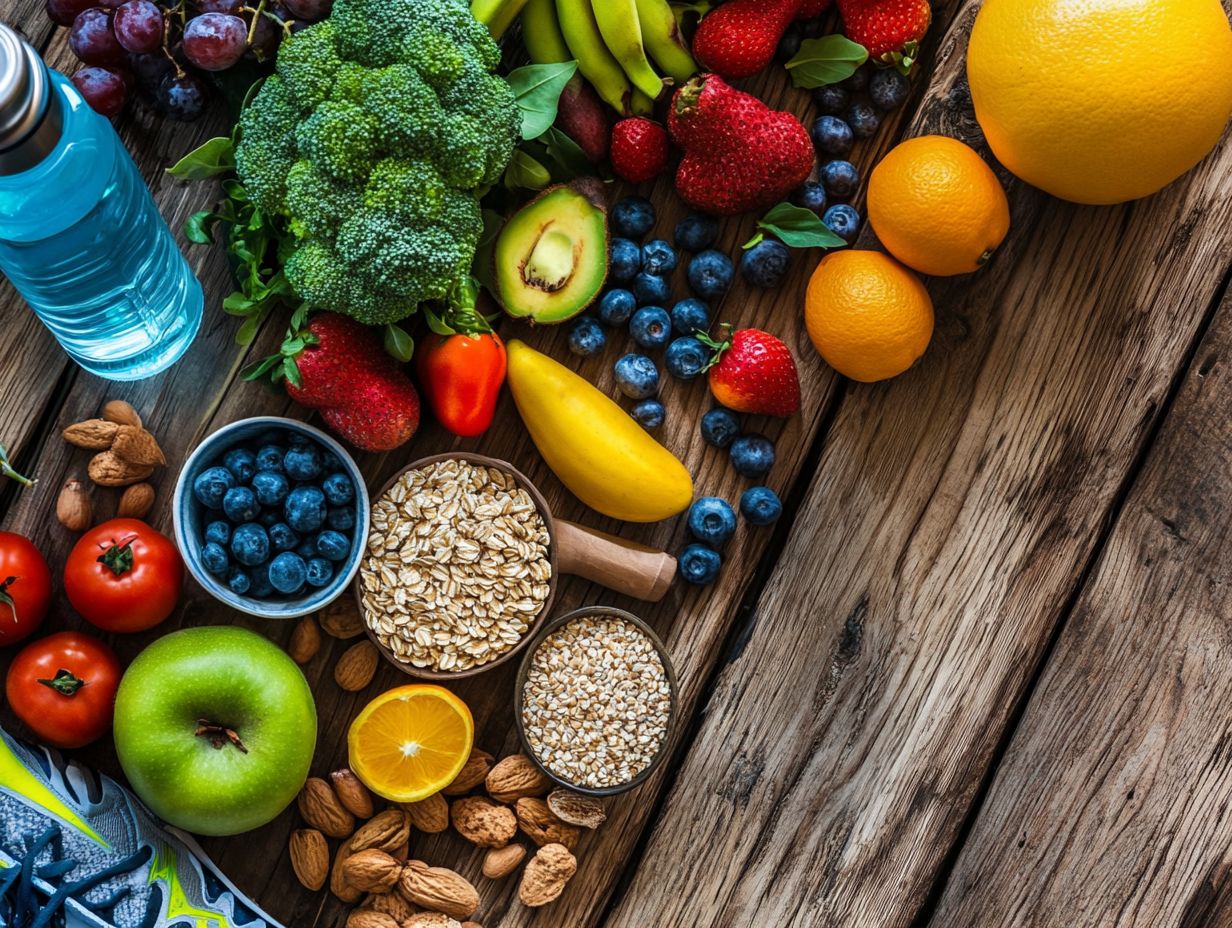
What is holistic nutrition and how can it benefit athletes?
Holistic nutrition focuses on nourishing the body and mind as a whole, benefiting athletes by improving physical and mental health, enhancing performance, and preventing injuries and illnesses.
What are some key elements of a holistic nutrition plan for athletes?
Key elements include consuming whole, nutrient-dense foods, staying hydrated, balancing macronutrient intake, and incorporating mindfulness and intuitive eating practices.
How can athletes support their recovery with holistic nutrition?
Athletes can support recovery by including anti-inflammatory foods like fruits, vegetables, and omega-3 fatty acids, staying hydrated, and ensuring adequate rest and sleep.
Are there any specific nutrients that athletes should focus on in a holistic nutrition plan?
Athletes should consume adequate protein, healthy fats, and complex carbohydrates, while also ensuring sufficient antioxidants, vitamins, and minerals through a variety of whole foods.
How can an athlete’s diet affect their mental well-being?
An athlete’s diet significantly impacts mental well-being. Poor nutrition can lead to mood swings and fatigue, while a balanced diet can improve mood, energy levels, and overall mental health.
Can athletes still enjoy their favorite foods while following a holistic nutrition plan?
Yes! Athletes can enjoy favorite foods while maintaining a holistic nutrition plan. Finding a balance and practicing moderation is key. Listen to your body’s cues and allow treats in moderation without guilt.


